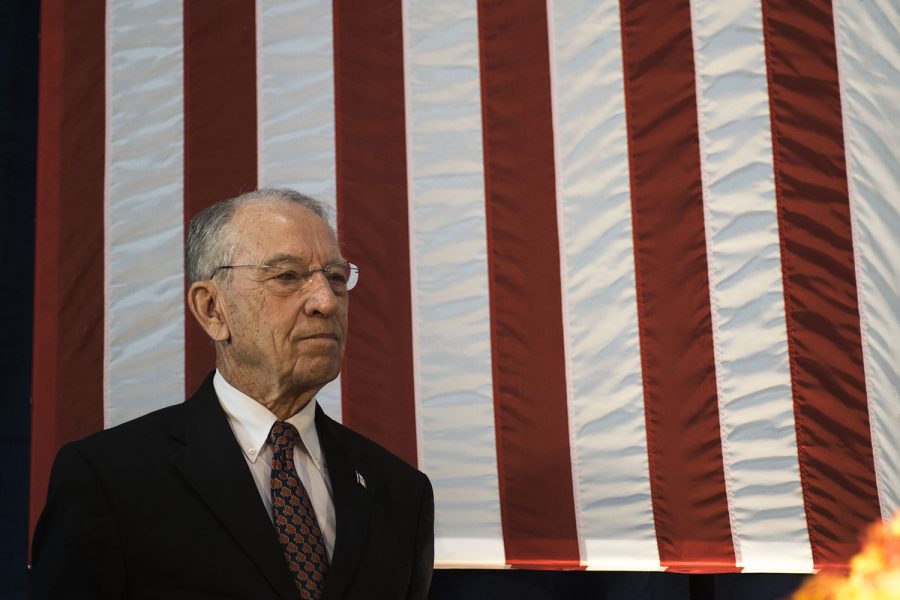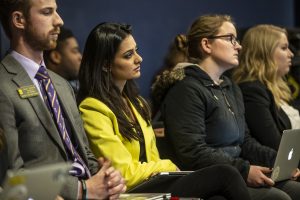Grassley raises concern for safety of U.S. intellectual property
Sen. Grassley is asking the federal government for information regarding foreign threats to U.S. research institutions.
Chuck Grassley stands on stage at the Second Annual Harvest Festival on Saturday, October 13, 2018. The event was a fundraiser for current governor Kim Reynolds.
April 2, 2019
U.S. research institutions, including the University of Iowa, often benefit from international cooperation, but opening those doors could allow some information to slip through the cracks via intellectual theft.
Sen. Chuck Grassley, R-Iowa, began investigating foreign threats to U.S. research institutions in October 2018. Now, he awaits an answer from government officials to his question, which asks if foreign countries are indeed plotting to steal taxpayer-funded research.
Grassley wrote letters to the Justice Department and the Health & Human Services Department inspector general requesting information on the vetting process of researchers, education of research institutions, and their maintenance of integrity in U.S. research.
“We have agencies that give out [public] grants,” Grassley said. “They have a responsibility that these grants are policed, and we know that the research we do doesn’t go to other countries to violate intellectual property or threaten our national security.”
As part of the Judiciary Committee last fall, Grassley said, he had the responsibility of making sure that such intellectual property was protected, which meant exercising his right to congressional oversight.
RELATED: FBI warns universities against Confucius Institute
“Congress has the right to make sure the executive branch is doing its job the way it’s intended,” Grassley said. “Our investigation started because we had both secured and unsecured briefings about national-security issues with other countries.”
Although Grassley admitted he doesn’t yet know the extent of the potential problem, he said a more thorough vetting of researchers might be a good solution, especially if the federal government stepped in to help individual institutions.
“They need to be doing more to help our research institutions perform background checks on people they’re dealing with, particularly if they come from a foreign country,” Grassley said. “I’ve got to remain concerned.”
He said the federal government must rely upon research institutions, because that’s where the expertise is. Thus, in his letters, he asks what steps federal law enforcement is taking, if any, to educate higher-learning institutions about the possible threat.
Stephen Pradarelli, the strategic communications director in the UI Office of the Vice President for Research, said the university sponsors approximately 210 foreign-national faculty and staff for employment authorization in research, who have temporary nonimmigrant status.
As a higher-learning institution that receives federally funded grants for research, Pradarelli said, all UI employees, national and international, must undergo background checks.
“The UI benefits enormously from the presence and contributions of foreign-national scientists and scholars in our labs and classrooms,” he said. “Many of whom bring unique skills and talents as faculty and staff to the work of discovery and academic inquiry.”
Nevertheless, he said the Research Vice President’s Office previously sent out a letter to campus, reminding faculty and staff that they are required to disclose professional relationships with foreign entities in relation to their responsibilities at the UI.
Bob Kirby, the director of the Iowa Center for Research by Undergraduates, emphasized the need for diligence on behalf of the UI in allowing — or not allowing — access to research materials that could be used by others.
“Because postdoctoral fellows, graduate students, and undergraduates play an important role in our institutional research efforts, it’s important we stay informed about the conversation,” he said.
Although Grassley’s concerns are fairly recent, Kirby said researchers at institutions such as the UI have recognized the need to screen individuals who join their research teams for many years now.
“Whether it is making sure information about research participants is protected or just making sure that the outcome of a study is not disclosed until appropriate publication, researchers have a consistent need to be discriminating in whom they involve in their research,” Kirby said.






